Building Management Systems (BMS) offer not only environmental benefits but also significant economic advantages. By optimizing energy and water use, BMS help reduce utility bills and maintenance costs, providing substantial financial savings. Data from buildings using BMS show that energy cost savings can be as high as 30%, leading to significant reductions in annual utility expenses. These savings are achieved through real-time monitoring and automated adjustments to lighting, HVAC, and other building systems, ensuring optimal energy use. This not only conserves natural resources but also translates into direct financial benefits for building owners, making BMS a valuable investment for sustainability and cost savings.
In addition to reducing utility bills, BMS also lower maintenance costs by providing predictive maintenance and operational insights. This helps identify and address potential issues before they become major problems, reducing the need for costly repairs and extending the lifespan of building equipment. For example, buildings using BMS have reported up to 20% reductions in maintenance costs. By proactively managing building systems, BMS ensure that they operate efficiently and reliably, minimizing the risk of unexpected breakdowns and maintenance expenses. This proactive approach not only reduces costs but also enhances the overall performance and longevity of building systems.
Case studies highlight the economic benefits of BMS, demonstrating significant cost savings and operational improvements. For instance, a large office building that implemented BMS reported a 25% reduction in energy costs and a 15% decrease in maintenance expenses. These financial benefits underscore the value of BMS in promoting sustainability and achieving economic savings. By optimizing resource use and enhancing operational efficiency, BMS provide a compelling return on investment for building owners. In conclusion, BMS provide substantial economic benefits through reduced utility bills and maintenance costs, making them a valuable investment for promoting sustainability and achieving financial savings.
Unlock significant economic benefits with our cloud-native building management solutions. Our innovative products help reduce utility bills and maintenance costs while promoting sustainability. Contact us today to learn more about our cutting-edge climate tech solutions.














